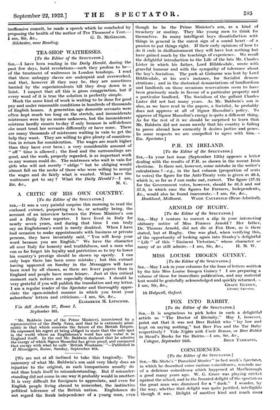A CRITIC OF HIS OWN COUNTRY.
[To the Editor of the SPECTATOR.]
SIR,—It was a very painful surprise this morning to read the enclosed extract, purporting to be, or actually being, the account of an interview between the Prime Minister's son and a Daily News reporter. I have lived in Italy for nearly seven years, and during that time I can truly say an Englishman's word is rarely doubted. When I have had occasion to make appointments with business or private persons, they have invariably said, " You will keep your word because you are English." We have the character all over Italy for honesty and truthfulness, and a man who can so far forget his loyalty and patriotism as to try to lower his country's prestige should be shown up openly. I can only hope there has been some mistake ; but this extract having appeared on Sunday in the Messaggero will have been read by all classes, as there arc fewer papers than in England and people have more leisure. Just at this critical moment such notices are especially dangerous. I should be very grateful if you will publish the translation and my letter. I am a regular reader of the Spectator and thoroughly appre- ciate the open-minded manner in which you treat your subscribers' letters and criticisms.—I am, Sir, &c.,
ELIZABETH M. LIPSCOMB.
Via dell Archetto 27, Rome I.
September 9th.
" Mr. Baldwin (son of the Prime Minister), interviewed by a representative of the Daily News, said that he is extremely pessi- mistic in that which concerns the future of the British Empire. He expressed his regret at being obliged to state that the only spot in the world where an Englishman's word has any value is. in England itself. In the end Mr. Baldwin declared that he admires the energy of which Signor Mussolini has given proof, and compared that energy with what he calls ' British Weakness.' "—Published in Messaggero, Rome, Sunday, September 9th.
[We are not at all inclined to take this tragically. The summary of what Mr. Baldwin's son said very likely does an injustice to the original, as such 'comparisons usually do and thus lends itself to misunderstanding. But if misunder- standing did not come in one way it probably would in another. It is very difficult for foreigners to appreciate, and even for English people living abroad to remember, the instinctive political tolerance of the British nation. Englishmen do not regard the frank independence of a young man, even though he be the Prime Minister's son, as a kind of treachery or mutiny. They like young men to think for themselves. In many intelligent boys dissatisfaction with things in general is the surest sign of a sound heart—of a passion to put things right. If their early opinions of how to do it ends in disillusionment they will have lost nothing but haVe gained much by the teachings of experience. We recall the delightful introduction to the Life of the late Mr. Charles Lister in which his father, Lord Ribblesdale, wrote with graceful humour and with the syMpathy of tolerance about the boy's Socialism. The park at Gisburne was lent by Lord Ribblesdale, at his son's instance, for Socialist demon- strations ; and in the rhetorical denunciations of landlordism and landlords on those occasions reservations seem to have been graciously made in favour of a particular property and a particular landlord. The Socialism of the gallant Charles Lister did not last many years. As Mr. Baldwin's son is also, as we have read in the papers, a Socialist, he probably does not approve at all of Signor Mussolini's policy. To approve of Signor Mussolini's energy is quite a different thing. As for the rest of it we should be surprised to learn that Mr. Baldwin did not mean merely that his country is failing to prove abroad how earnestly it desires justice and peace. In some respects we arc compelled to agree with hull.— En. Spectator.]






































 Previous page
Previous page